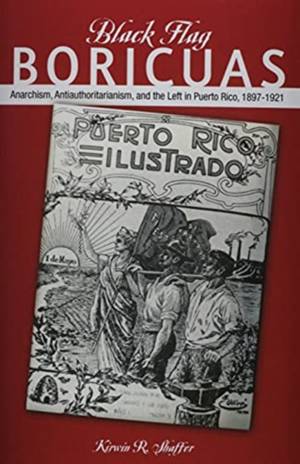
- Retrait gratuit dans votre magasin Club
- 7.000.000 titres dans notre catalogue
- Payer en toute sécurité
- Toujours un magasin près de chez vous
- Retrait gratuit dans votre magasin Club
- 7.000.0000 titres dans notre catalogue
- Payer en toute sécurité
- Toujours un magasin près de chez vous
Description
This pathbreaking study examines the radical Left in Puerto Rico from the final years of Spanish colonial rule into the 1920s. Positioning Puerto Rico within the context of a regional anarchist network that stretched from Puerto Rico and Cuba to Tampa, Florida, and New York City, Kirwin R. Shaffer illustrates how anarchists linked their struggle to the broader international anarchist struggles against religion, governments, and industrial capitalism. Their groups, speeches, and press accounts--as well as the newspapers that they published--were central in helping to develop an anarchist vision for Puerto Ricans at a time when the island was a political no-man's-land, neither an official U.S. colony or state nor an independent country. Exploring the rise of artisan and worker-based centers to develop class consciousness, Shaffer follows the island's anarchists as they cautiously joined the AFL-linked Federación Libre de Trabajadores, the largest labor organization in Puerto Rico. Critiquing the union from within, anarchists worked with reformers while continuing to pursue a more radical agenda achieved by direct action rather than parliamentary politics. Shaffer also traces anarchists' alliances with freethinkers seeking to reform education, progressive factions engaged in attacking the Church and organized religion, and the emerging Socialist movement on the island in the 1910s. The most successful anarchist organization to emerge in Puerto Rico, the Bayamón bloc founded El Comunista, the longest-running, most financially successful anarchist newspaper in the island's history. Stridently attacking U.S. militarism and interventionism in the Caribbean Basin, the newspaper found growing distribution throughout and financial backing from Spanish-speaking anarchist groups in the United States. Shaffer demonstrates how the U.S. government targeted the Bayamón anarchists during the Red Scare and forced the closure of their newspaper in 1921, effectively unraveling the anarchist movement on the island.
Spécifications
Parties prenantes
- Auteur(s) :
- Editeur:
Contenu
- Nombre de pages :
- 240
- Langue:
- Anglais
Caractéristiques
- EAN:
- 9780252085574
- Date de parution :
- 01-06-20
- Format:
- Livre broché
- Format numérique:
- Trade paperback (VS)
- Dimensions :
- 152 mm x 229 mm
- Poids :
- 399 g

Les avis
Nous publions uniquement les avis qui respectent les conditions requises. Consultez nos conditions pour les avis.






